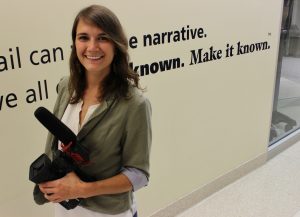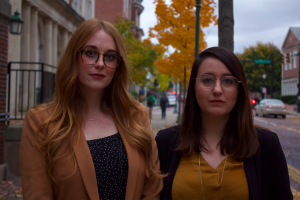News
Lawsuits Claim OU Lacking on Sexual Harassment Training
By: Susan Tebben
Posted on:
ATHENS (WOUB) — A common link between the two most recent sexual harassment-related lawsuits filed against Ohio University is a call for increased and improved training for faculty and other mandatory reporters.
The latest lawsuit , against OU and Journalism professor Yusuf Kalyango, accuses Kalyango of abusing his power as an authority figure when interacting with graduate students, and accuses the university of allowing that to happen with “deliberate indifference.”
Along with being a professor, Kalyango was the head of two grant-funded programs conducted through the university — the Study of the U.S. Institutes (SUSI) and Young African Leaders Initiative (YALI). The professor’s actions mentioned in the lawsuit allegedly occurred throughout the spring and summer of 2017.
He is currently suspended from teaching, but is still doing administrative work.

In arguing the university’s part in the lawsuit, attorney Michael Fradin alleges professors, through their own actions and through a lack of training, failed to perform their duties as mandatory reporters. Philosophy professor Jeremy Morris, for example, was told about Kalyango’s alleged actions by the plaintiff in the lawsuit, Tess Herman.
“Professor Morris immediately expressed alarm when he learned this and told (Herman) that this was not okay,” Fradin wrote in the lawsuit.
But Morris said he didn’t know the proper channels to send the reported harassment, according to the lawsuit and a statement Morris sent to WOUB News. Morris was told about alleged actions by Kalyango on a weekend, less than 36 hours before Herman was set to leave the country to work with the SUSI program, he said.
“Beyond my urging her to report this to an administrator, neither of us knew what to do especially under such time pressure, since neither of us had had any formal training in how to respond to that situation,” Morris told WOUB.
Under Ohio law and university policy, faculty and staff are designated mandatory reporters, who are obligated to report any allegations of sexual harassment and misconduct. Those reports are typically handled by OU’s Office of Equity and Civil Rights Compliance.
Another professor named in the lawsuit, Journalism professor Mary Rogus, who served as Academic Director of the SUSI program, cited her duty as mandatory reporter in denying allegations that she tried to persuade Herman not to report Kalyango.
Rogus said she received an email from Herman notifying her of Herman’s resignation from SUSI. According to Rogus, Herman said she decided to resign “because of concerns about working with Dr. Kalyango,” and that, after consultation with “various offices on campus,” her resignation “was the necessary conclusion for (Herman’s) safety and well-being.”
“The language she used raised a red flag for me as one of her supervisors and as a mandatory reporter in my capacity as a faculty member at Ohio University,” Rogus wrote in a lengthy statement to WOUB. “So, of course, as is my responsibility, I immediately called Ms. Herman to find out what was going on.”
But, Rogus claimed she had “had no information on any of the details of the allegations (Herman) was making against Dr. Kalyango” until the formal complaint was filed. She said Herman had “made it clear” a complaint was “already in process.”
The third professor named in the suit, Judith Millesen, is no longer employed at OU, and did not respond to requests from WOUB for comment. Kalyango denied any wrongdoing when the allegations were released, but multiple requests for comment sent to his attorney since then have been unanswered.
Fradin claimed in the lawsuit the university enables professors to abuse authority “by continuously failing to implement sufficient mechanisms to prevent professors from using their authority to seek sexual and romantic relationships with students, and by continuously failing to inform and train professors who witness this type of behavior how to correctly respond to it.”
Previous Lawsuit Claims Need For Change
This is not the first time the university has been accused of allowing such behavior due to inadequate resources.
A previous lawsuit filed by two graduate students in OU’s English department, Christine Adams and Susanna Hempstead, sought to hold the university accountable for sexual harassment by former professor Andrew Escobedo. An ECRC investigation substantiated the women’s allegations against Escobedo.

Photo by Meghan Rowe
The lawsuit was filed in March 2017, and settled in November 2018. The university denied wrongdoing, but the women received a settlement for $335,000 each.
OU also agreed to make a statement spelling out the resources available to students on campus who experience sexual harassment or misconduct.
“Moving forward, Hempstead and Adams hope that Ohio University will set itself apart as an active participant in the discussion of power dynamics and sexual violence and prove itself to become a leader in implementing institutional policies that will better allow its students to grow and learn in an environment free from discrimination, harassment, and violence,” the women said in a statement from their attorney when the settlement was announced.
As a part of the lawsuit, Adams and Hempstead were invited to “participate in the university’s efforts to combat sexual violence on its Athens campus” by working with ECRC and/or OU’s Presidential Advisory Council on Sexual Misconduct, according to settlement documents.
Current Training At OU
Along with monetary compensation for Herman, Fradin is asking the U.S. District Court Southern District of Ohio to order that OU “provide mandatory training for all mandatory reporters using trauma informed principles,” and “create a system of reporting sexual misconduct that is less intimidating for the most vulnerable members of the community: students, untenured faculty, and junior faculty.”
According to university spokesperson Carly Leatherwood, a new process for training faculty and staff in “sexual misconduct education” was implemented in October 2017, seven months after Adams and Hempstead filed their lawsuit and eight months after Kalyango’s actions allegedly began.
OU President Duane Nellis “set a goal of 100 percent completion” when the program was implemented. It is not clear whether that goal was met.
“The training has been automated into the onboarding process for new employees, who must complete the training within the first 30 days of their employment with OHIO,” Leatherwood told WOUB.
ECRC also gives “individualized training” by request to departments on campus, and is “in the process of hiring a new position that, among other items will prioritize efforts on sexual misconduct prevention training,” Leatherwood said.
No hearing has been set for Herman’s case. OU does not comment on ongoing litigation, according to Leatherwood.

